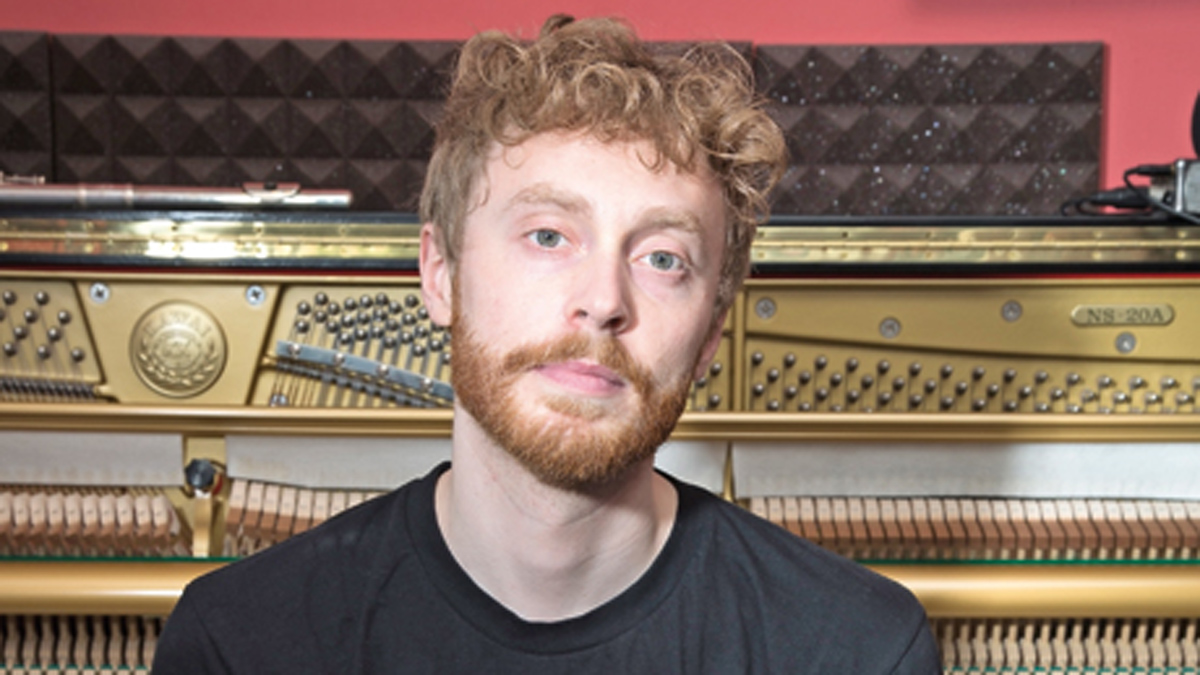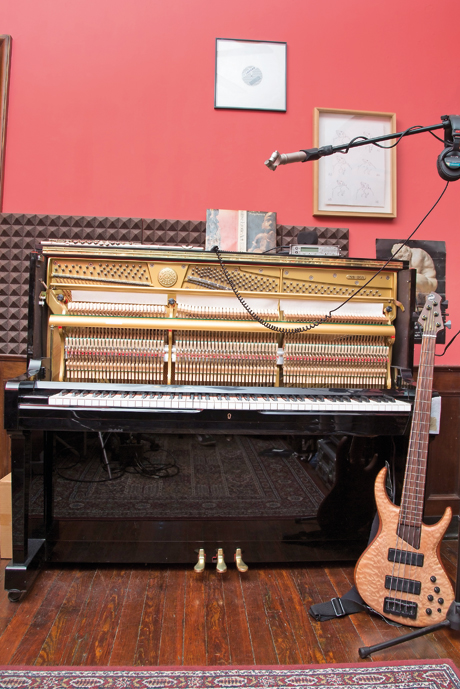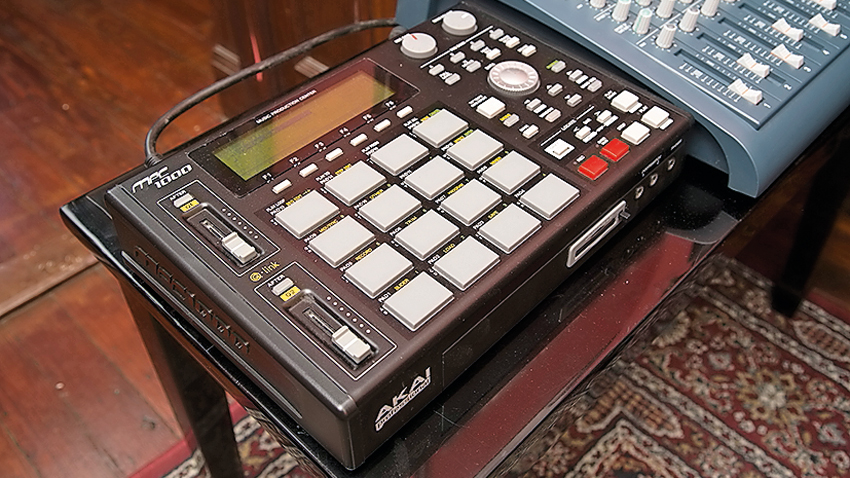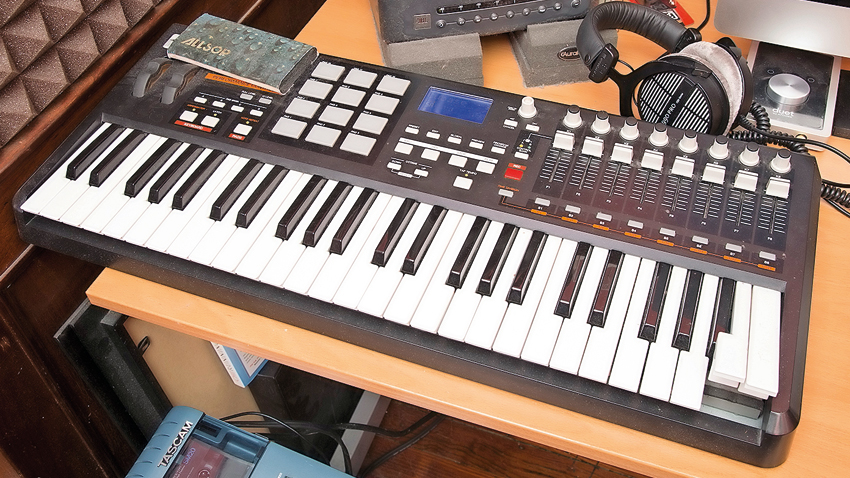FaltyDL talks gear, blueberry hills and feeding his creativity
Six albums in, Drew Lustman (aka FaltyDL) is still a producer working with broken studio gear and driven by creative experimentation

Want all the hottest music and gear news, reviews, deals, features and more, direct to your inbox? Sign up here.
You are now subscribed
Your newsletter sign-up was successful
Brooklyn-based producer Drew Lustman’s career in music production hit all the right notes when his debut FaltyDL album, Love Is A Liability, got signed to Planet Mu. Within a couple of years, he’d signed for Ninja Tune, who put their campaign strategy behind his third album Hardcourage. At that point, Lustman’s career trajectory seemed to be on a one way ticket to the top as support slots materialised for James Blake and Radiohead.
A huge Squarepusher fan, he almost “had a stroke” when he was invited to open for the breakcore legend in his home town, New York. But when the dust died down, Lustman discovered that you can’t be the golden boy forever. That realisation drove him to take ownership of his career and start his own Blueberry Records label, marking the arrival of his latest instrumental tour de force, Heaven Is For Quitters.
Your record label is named after your grandmother’s blueberry hill. That sounds like quite a romantic story…
“Yeah, it’s this cool hillside mountain in Northern Maine, pretty far away from where I live in New York. In the 50s she and her husband bought some very cheap land that was also fertile wild blueberry growing land. He built the house up there with his own hands and it’s still in the family. I used to go up there as a kid and loved riding around eating wild blueberries. I also found out later on that weed grew wild up there as well.”
The new album title, Heaven Is For Quitters, sounds deep. What’s the story behind that?
“I like to send out confusing signals, partly because I don’t want to be understood too much. I’ve always found that I form a personal relationship with albums that I really like and give them a meaning that might not have been initially intended. Pick a band or a group that’s been around for the majority of your adult listening and they sort of soundtrack whatever’s going on during different phases in your life. With Heaven Is For Quitters more specifically, when I was signed to Ninja Tune and getting money thrown at me, it felt like, 'Whoa, this is the way it’s going to be', but it gets really difficult. I’ve found I’ve only had to work harder to maintain some sort of career. But nothing is for certain; I was talking to my friend, a well-known producer from London, and we joked that we might be driving vans next week.”
That comes with the business doesn’t it? It can be very fickle.
Want all the hottest music and gear news, reviews, deals, features and more, direct to your inbox? Sign up here.
“Entirely - but it’s beautiful, too. What happened to me happens to everyone, which is that when you’re new, people want to book you, the press write about you and record labels holler, and it’s an incredible opportunity; but you sort of notice that fades and you go through a dip as younger producers come around. But instead of being frustrated by that, I just started Blueberry Records and signed new talent that I wanted to work with.”
You toured with James Blake and opened for Radiohead. Did you get to meet them, and what did you learn from opening for such huge acts?
“James Blake and I started releasing records around the same time. Of course he had that stratospheric rise, but we’ve remained friends over the years, and when he asked me to open for him it was just fun being on the bus with his whole crew just when he was getting really big. It helped light a fire under my own ass.
“With Radiohead, I met them all and Thom Yorke was very kind. He emailed me and asked me if I wanted to play and at first I wasn’t even sure it was him. But yeah, that was a very magical weekend that I’ll never forget. The gigs were here in NY - that’s the gig you invite your parents to.”
You release albums at a pretty high churn rate.
“It doesn’t seem that difficult for me. If I’m really focused on my day job of making music then if I’m making a couple of tracks a week, by the end of the year I’ve got 100 tracks. So it’s not hard for me to put an album together, especially as, when an album comes out, I stop making music for a month or two because I’m doing the press side of it. Right now, I haven’t made music in four weeks and I’m losing my mind.”
This album took two years to make, and we’ve read that it’s the most time you’ve ever put into anything. Do you think it’s benefited from that extra level of attention to detail?
“It’s definitely proven to be a more relaxed way to do things. I don’t really respond well to deadlines as I’m already making a lot of things. It’s allowed me to seek and explore more new angles. I’m listening to a lot more music these days that isn’t necessarily club-centric, but inspiration is a funny thing; I never know when it’s going to come or how long it’s going to last. I might write an album in one month that’s better than an album that took me two years.”
Do you ever battle to find inspiration?
“I really believe that half the battle is just getting yourself into the studio and in front of your workstation. There’s no point moping around thinking you don’t have any ideas when you’re not even physically in front of your computer. Try to relax a bit, don’t worry so much about it, and play and experiment. My music’s still an experiment. I don’t know what it’s going to sound like when I go into the studio, and it’s always a surprise when I realise what I’ve made.”
It seems like the bigger the struggle, the more an artist benefits creatively from emotional turmoil. Is friction necessary?
“I’ve thought about that and wondered if a good drug habit would affect my music. At the end of the day, even if having something heavy going on in your life is a factor, you’ve still got to get to a place where you can lay that down without it getting in the way so much. I think you can totally make good music whether you’re happy or sad, but for something that I’ve thought about so much, I don’t have a concrete answer for it.”
Without the lyrics, do you find it’s more difficult to attach a sense of meaning to instrumental music?
“It’s funny because I grew up listening to a lot of instrumental electronic music that had zero lyrics but seemed to tell a complete story to me. I view lyrics as an instrument, not a description. If the lyrics are too lyrical, I kind of tune them out because it sounds like pop music to me. It goes back to what I was saying before: I can’t form a personal attachment to something that’s very literal because it feels like I’m being told what to believe. I always feel like if I can get the right chord progression, then there’s just as much emotion being carried across as something that has lyrics.”
That said, there are a couple of tracks with vocals and Infinite Sustain is excellent. Did you have the music written first and then decide it would suit a vocalist?
“I had a rough draft of the instrumental, which I ended up taking all the drums out of in the intro and was playing it to the singer, Hanna Cohen. Everyone knows everyone in New York, so I just cold-dropped her an email and said what do you think of this? She got right back, came into the studio and wrote the lyrics pretty much on-the-fly, then we recorded it all in the one session. It was one of the first times I’ve ever really recorded a person singing at my place, so I was a little nervous.”
The real budget shit that I get a crack out of is that I’ll hang a blanket on a wall or over a doorway so I don’t hear the refrigerator coming through. Just get creative and use your apartment to make a good recording booth.
Any tips for recording vocals on a budget?
“I’ve worked with $4,000 Neumanns before and, yeah, they sound incredible, but I got a pretty good microphone - a Rode MT4 - which has been good for field recordings and vocals. It’s got a stereo mic end, so you need to sing directly at the centre of it, which is kind of tricky.
“Budget-wise, get a cheap mic and a cheap recording device. If you’re going to spend money anywhere, I would do it at the software end for when you’re processing the vocals. The real budget shit that I get a crack out of is that I’ll hang a blanket on a wall or over a doorway so I don’t hear the refrigerator coming through. Just get creative and use your apartment to make a good recording booth.”
Do you go out with a mic and record environments, too?
“Yeah, I do. I use the MT4 mic and a Sound Devices 722, which is beautiful. It’s probably a bit outdated now, but it’s a really solid, rugged piece of gear and has a really great card inside that reads samples at 96Hz. I did it a lot more when I first moved to New York. I was very excited about being that guy on the subway recording everything all over Brooklyn. Now I just stick the mic out of the front window to my apartment and record the cars as they go by.”
We read that you tried making music for clubs but something always pulled you in another direction. Do you think it’s important to allow your subconscious to lead the creative process?
“It’s funny, because when I’m thinking too much it just gets in the way of the creative process and how it should be going - so I’d say the less you think about that sort of thing the better. I find that the more guttural the experimentation is, the truer the reflection of the music that I’m hearing in my head. When I started making music, I’d just started coming out of club culture, so it made sense to want things to sound good on a system. That was the goal: just to get DJs to play things. The goal has changed over the years, for sure. As I’ve spent less time in clubs, I’ve just found myself wanting to make music that I can play anywhere else. People are always listening to music and soundtracking their lives, and most of them don’t spend a lot of time in clubs.”
I find that the more guttural the experimentation is, the truer the reflection of the music that I’m hearing in my head.
The track Frigid Air was done with µ-Ziq. How did that collaboration come about?
“Mike Paradinas has worked on a lot of my albums in the past - the ones that came out on his label, Planet Mu, and he’s also helped with the tracklisting for a couple that I released on Ninja Tune. We were sending ideas back and forth, so Frigid Air went over to him minus a few of the synths that are on it now. He had some ideas and melodic lines for it, recorded them and, initially, I was going to try and replay them, but they sounded so good I just kept them in and said let’s call this a collab. I’ve wanted to make music with him since forever.”
The intro instrumental, Tasha, is gorgeous. Can you tell us about the production process behind that one?
“A lot of that is all synthesis. Some of the strings are samples, but from a sample string pack. I really sort of wrote that one. I love those intro instrumental tracks that leave you hanging at the end. They whet your appetite and you always want a little bit more. I write a lot of stuff and my friends say, man this could be in a movie it’s so cinematic, and I hope it is! I have a publisher and also have my outlets, but getting into that world is tricky and I don’t know how to do it so well.”
Are you very influenced by thematic or soundtrack music?
“Yeah, the stuff that remains in my head from my childhood is often the theme to that movie I loved when I was 13 years old. Even cheesy stuff like John Williams or the new school of classical composers like Jóhann Jóhannsson, because that stuff is incredible and gives me a lot of ideas. I’ll sample it, too. I come from hip hop in a way, so I still think sampling is great.”
You have a big record collection - are you sampling from that?
“I do, and I’ve got about 1,000 records. I’ve got two Technics 1200s, two SL1210 M5Gs, which are fucking beautiful, and a Serato Rane 62 mixer, and it’s really easy to sample records by just plugging my computer right into the Rane mixer.”
Is that also your DJ setup?
“I’ve used Ableton to perform live for a number of years, but now I’m DJing mostly with turntables and CDJs. I decided that I don’t want to bring my laptop into clubs anymore where there are drinks getting spilled everywhere. I actually find it more versatile right now to DJ on a couple of CDJs with a USB than doing the whole Ableton thing.”

The melodies on the album sound like they’re played in real time, as if you’re using a MIDI keyboard rather than a mouse…
“I am using a MIDI keyboard, but at the heart of it, I’m still using Reason. I think I’ll be moving away from mouse stuff, although not to hardware synths. I’m very focused on the piano I have now, the Kawai NS-20A.
“I got it for two reasons. First, I was tired of using big piano sounds on software, but I also wanted an instrument that’s immediate and I don’t have to turn on or plug in. I just swivel my chair and it’s all set up right there to play, and that really spoke to me. I’m not recording it at the moment; it’s just become part of my new practice to wake up and play the piano in the morning.
“So, I play, make music for myself and then it disappears. I’ll spend a week working on a couple of ideas, and then I’ll set up a microphone, but I do like the impermanence of it – if that’s the right word!
“Heaven Is For Quitters is probably the last album I’ll write on Reason V3 because I’ve got a new computer, so I’m now using the new version.”
Will you typically hand over the mastering to an engineer to complete the records?
“Yeah I do, but I’ll attend if at all possible. I usually use Matt Colton at Alchemy in London; he’s done many of my albums. I trust Matt a lot with my sound. He did one album, In The Wild, without me when I was on tour in South America, but being there is so much better. I came to London to attend the mastering session for the new album and played a gig in London and Berlin that week to pay for the flights and the mastering. The reason I use Matt is because it doesn’t feel like there’s another artist on the album all of a sudden. He’s very subtle and just wants your sound to get highlighted without doing anything super-drastic to the track other than a lot of limiting, some voluming and EQing. And he’s sending it all through these $20,000 gold-plated cables and a $100,000 compressor, and all that stuff sounds really great.”
Would you agree that you can tell when an album is well mastered primarily going by the bass frequencies?
“Yeah, that’s true. I can’t remember who said it, but part of mastering for home producers is actually down to getting rid of a lot of bass. We’re not producing on really big speakers in our homes, so when we get to the mastering stage it’s all about handling the crazy amounts of bass we’ve put in there. For EDM, it makes sense to compress the hell out of things; that shit should sound like a total Lego brick. That’s what the kids want and it sounds good in a big arena, but I like dynamics as well and people forget you can master it quiet, not clip anything and then just turn the mixer up and it’s most likely going to sound better.”
What sounds are you most frequently turning to inside the box?
“I use a few small little programmes like WireTap to sample things online. The funny thing is that because Reason never accepted VSTs, over the last ten years friends were always talking about the latest ones and I didn’t even know what they were. I have such a small amount of tools in my quiver, so to speak, and I think that’s pushed me to get creative with them, and with my sampling as well.
“I think music is so endless that you should never really be able to run out of ideas. For me, it all has to have a natural feeling to it. There are some producers where sound design is really their forte, they can build these soundscapes and tweak endlessly; but I just go for what feels right. If I’m messing around with a sound and haven’t figured it out in 15 minutes, I’ll get rid of it and move on. Music has to be quick and visceral. Because I come from a background of playing instruments, it can’t be too academic.”

Is that why you like using the Akai MPC1000, for its hands-on qualities?
“It’s a classic beat-making tool. I used it a lot on a couple of the Jungle tracks on The Crystal Cowboy, just for some of the breaks and the way I was triggering the samples. I need to delve into it more; it’s great for cutting and chopping stuff up, replaying things in an interesting way and recording them back into the computer or my Tascam four-track. You don’t even need a computer, you can sequence in the Akai if you’ve got enough RAM.”
Are you using the Tascam specifically because it’s a tape-based unit?
“Yeah, I like to use it for a little bit of the natural tape compression it offers, but what’s great about the Tascam Portastudio is that it has this incredible pitchbend. It’s almost like the +/-16 you find on a turntable. You can record in a sample, play it on the tape and then pitch it way up or down, mess with it and find new frequencies that really stand out and change the entire character. It’s a really good pitchbend, and it’s not digital so it doesn’t sound like there are any artifacts in there.”

You mentioned about using a half-broken MIDI controller…
“I have an Akai MPK49 and the two highest notes are completely snapped off. It’s funny because it’s probably my cheapest bit of gear but I won’t replace it because I feel like I know it so well. It’s just part of the family.”
And you don’t have any other hardware synths?
“I had a Yamaha DX-7 for a little while, but at the time, when I was using Reason, I was getting so frustrated because you can’t record audio on it, so I ended up selling it. So no hardware synths, but it would be fun to have a Roland 303 or an 808. I do have a Korg Monotron Duo - the little battery-powered ribbon synthesizer - and it can make incredible sounds. It sounds dinky through its little speaker, but if you plug it into a system, it’s got the full range right there. It’s got two VCOs, two voices, a pitch control, a cutoff and a peak. I mean you can get way down low and do all sorts of stuff; the only problem is the batteries get zapped really quickly.”
Heaven Is For Quitters is out now. Check out FaltyDL's website for more info and tour dates.


Future Music is the number one magazine for today's producers. Packed with technique and technology we'll help you make great new music. All-access artist interviews, in-depth gear reviews, essential production tutorials and much more. Every marvellous monthly edition features reliable reviews of the latest and greatest hardware and software technology and techniques, unparalleled advice, in-depth interviews, sensational free samples and so much more to improve the experience and outcome of your music-making.
